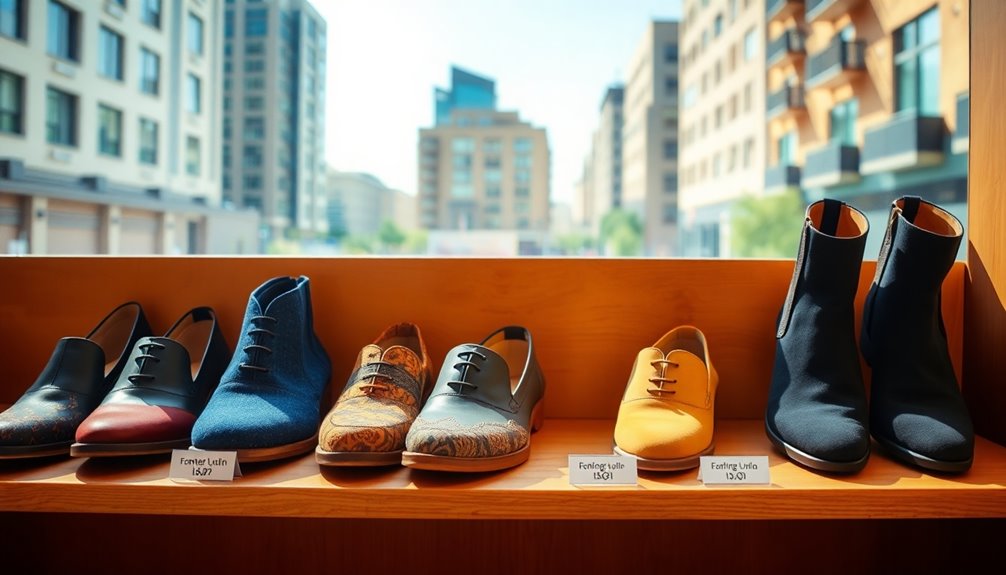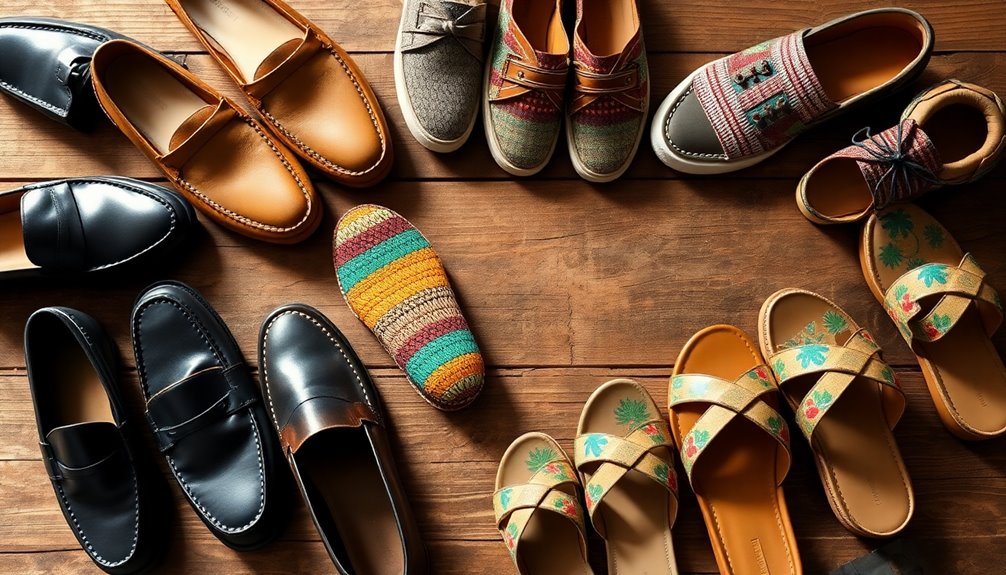If you're looking for shoe companies that support Israel, brands like Adidas, Puma, and Skechers are often criticized for their ties to Israeli initiatives. Adidas had past sponsorship deals that sparked outrage, while Puma's sponsorship of the Israeli Football Association led to ongoing boycott calls. To support ethical fashion, consider alternatives like Onitsuka Tiger and Bata, both of which have no connections to Israeli policies. By choosing these brands, you can align your purchases with your values. Interested in discovering more ethical options and insights? There's plenty more to explore on this topic!
Key Takeaways
- Major brands like Adidas, Puma, and Skechers face boycotts due to their ties to Israeli initiatives and sponsorships.
- Ethical alternatives include Onitsuka Tiger and Bata, which have no connections to Israeli support or military events.
- Local Egyptian brands offer stylish footwear options without political implications, promoting ethical consumerism.
- Social media campaigns, such as #BoycottPUMA, raise awareness about brands supporting Israel and influence consumer choices.
- Understanding cultural and political contexts is crucial for consumers seeking ethical fashion aligned with their values.
Overview of Shoe Brands Supporting Israel
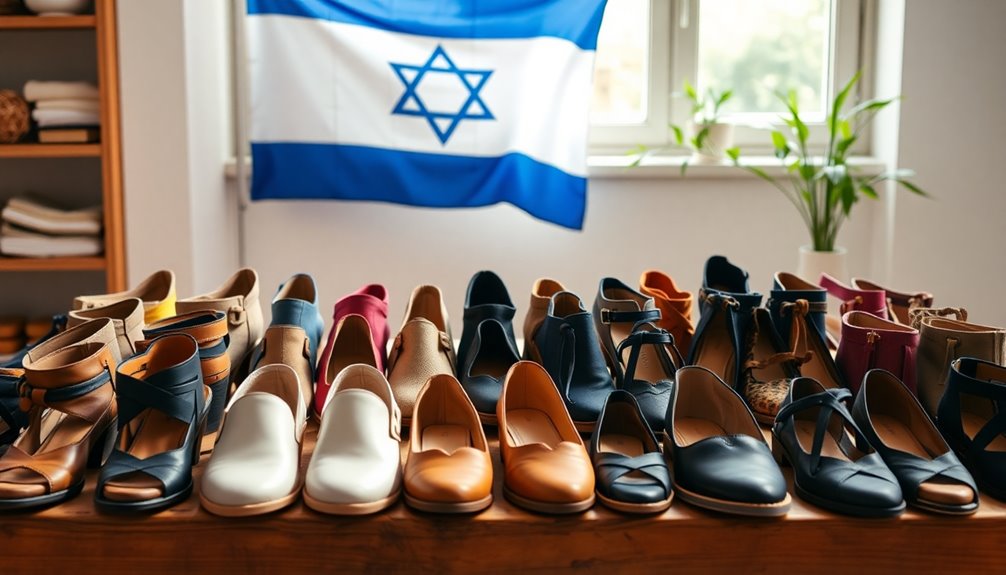
Supporting Israel, several major shoe brands have drawn attention and controversy in recent years. Brands like Adidas, Puma, and Skechers have faced significant backlash due to their connections with Israeli initiatives, particularly regarding sponsorships that many see as legitimizing illegal settlements.
After Adidas withdrew its sponsorship of the Israeli Football Association in 2018, Puma stepped in as the sole major sponsor, prompting intense boycott campaigns from activist groups.
Adidas hasn't escaped criticism either; its custom shoes created for pro-Israel events have sparked consumer awareness and outrage. Skechers has also been included in boycott discussions alongside other brands like Nike and Timberland, whose positions on the issue remain unclear.
The Boycott, Divestment, Sanctions (BDS) movement actively targets these shoe brands that support Israel, advocating for consumers to seek out alternatives that align with ethical fashion principles and avoid supporting controversial initiatives.
As a conscious consumer, you might want to reflect on how your choices impact social justice issues. By staying informed about the brands you support, you can make decisions that resonate with your values while promoting ethical fashion.
Major Brands to Boycott
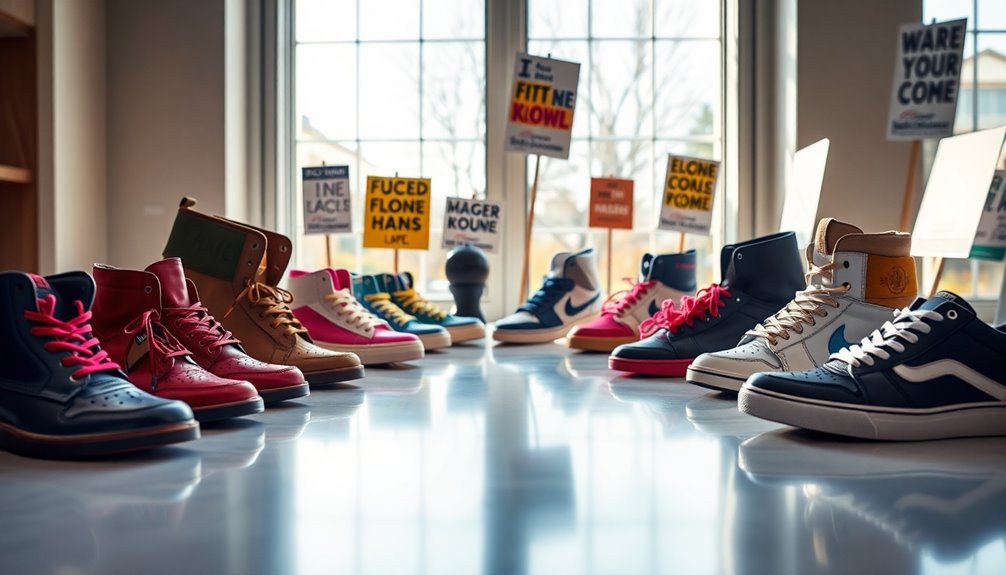
As the conversation around ethical consumerism intensifies, several major brands have emerged as targets for boycott due to their support for Israel.
Adidas, Puma, and Skechers are at the forefront of this movement. Adidas has a troubling history, having previously sponsored events for the Israeli military, raising serious ethical concerns among consumers.
Puma became the sole major sponsor of the Israeli Football Association in 2018, leading to ongoing calls for boycott ever since Adidas stepped back.
Skechers is often mentioned in discussions about boycotting brands due to its ties with Israel, reflecting a growing movement focused on ethical consumerism.
The BDS movement has been instrumental in organizing grassroots campaigns urging consumers to avoid brands like Nike and Timberland, scrutinized for their affiliations with Israel.
By choosing to boycott these brands, you're joining a broader effort to protest against their complicity in international law violations concerning Palestinian rights.
Understanding the impact of your purchases is essential.
When you decide to avoid these brands, you're advocating for a more ethical approach to consumerism, aligning your purchasing power with your values.
Ethical Alternatives to Boycotted Brands

If you're looking for ethical footwear options, consider brands like Onitsuka Tiger and Bata, which align with your values.
You can also explore local Egyptian brands that offer stylish alternatives without supporting the Israeli-Palestinian conflict.
Recommended Ethical Footwear
When searching for ethical footwear alternatives to brands that support Israel, it's imperative to take into account options that align with your values.
If you're looking for ethical alternatives to Adidas, consider Onitsuka Tiger. This brand has no ties to Israeli support and stands out for its commitment to ethical practices.
Bata is another excellent choice; recognized for its ethical stance, it avoids complicity in human rights violations, making it a viable option for conscious consumers.
Additionally, if you're exploring local options, some Japanese shoe brands available in Tokyo are also free from connections to supporting Israeli apartheid.
These brands prioritize ethical production and sourcing, allowing you to make informed purchasing decisions while supporting Palestinian human rights.
Local Brand Alternatives
Exploring local brand alternatives can lead you to ethical footwear that aligns with your values, especially if you're looking to avoid companies that support Israel.
By supporting local brands, you can make a statement about human rights and corporate responsibility. Here are some ethical alternatives to evaluate:
- Bata: Known for its commitment to social responsibility, Bata offers quality shoes while prioritizing ethical production practices.
- Onitsuka Tiger: This Japanese brand provides stylish options without the political baggage associated with larger corporations.
- Local Egyptian Brands: Emerging from Egypt, these brands focus on ethical sourcing and support the BDS movement, promoting human rights through their business models.
- Nepalese Footwear: Local manufacturers in Nepal are dedicated to sustainable practices and fair labor, offering unique designs that reflect their culture.
Choosing these local brands not only aligns with your values but also supports ethical fashion that fosters economic growth in your community.
Reasons for Boycotting Shoe Brands
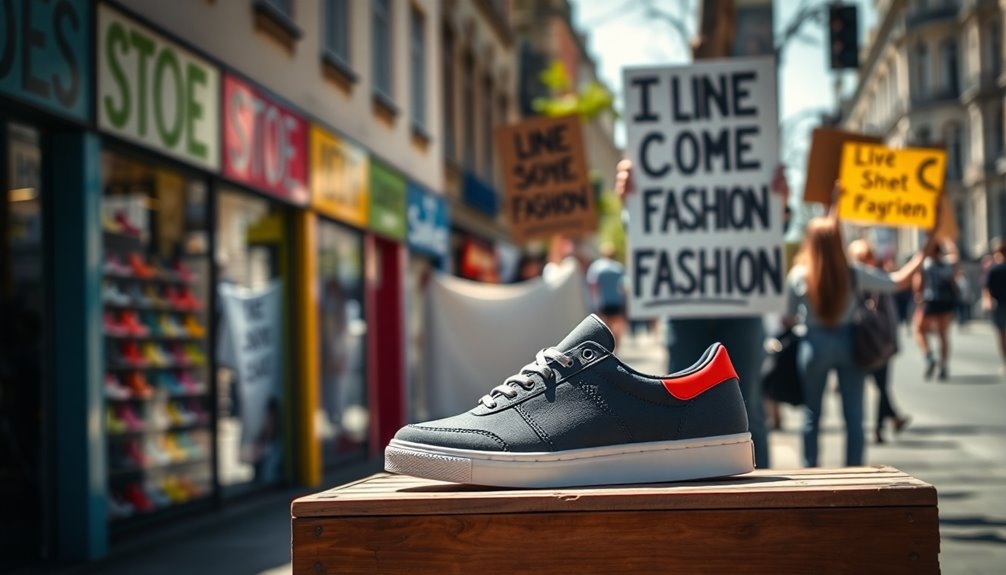
Many consumers are choosing to boycott certain shoe brands due to their perceived support for Israel and its policies in occupied territories. Activists and shoppers alike have launched boycott calls against major brands like Adidas, Puma, and Skechers for their ties to Israeli settlements.
The BDS movement has specifically spotlighted Puma for sponsoring the Israeli Football Association, which is linked to illegal settlements on Palestinian land. While Adidas withdrew its sponsorship in 2018, its past support still fuels ongoing boycott campaigns.
Boycotting these brands serves as a protest against their complicity in human rights violations and support for these settlements. By participating in this movement, you align yourself with ethical consumerism, advocating for brands that respect human rights.
There are plenty of alternatives that don't have ties to Israel, such as Onitsuka Tiger and Bata, allowing you to make choices that reflect your values.
Choosing to boycott brands associated with unethical practices not only sends a message but also supports a growing movement of consumers demanding accountability. By making informed choices, you contribute to a more ethical fashion landscape that prioritizes human rights over profit.
Impact of Boycotts on Corporate Policies

Boycotts have proven to be a powerful tool for consumers seeking to influence corporate policies, particularly in the context of brands linked to controversial practices. The impact of these collective actions can be significant, as seen with brands like Puma. Here are some key points to reflect upon:
- Puma announced its decision to end its sponsorship of the Israeli Football Association, responding to public pressure and accusations of complicity in illegal settlements.
- The Palestinian-led BDS movement has successfully swayed over 200 football teams to call for brands to withdraw support, showcasing the effectiveness of unified consumer actions.
- Major retailers, including Liverpool and Chester football clubs, have chosen not to renew contracts with Puma, illustrating how boycotts can shift corporate sponsorship decisions.
- Ongoing campaigns, such as #BoycottPUMA, continue to apply pressure on companies until they sever ties with organizations violating international law.
These examples highlight how sustained boycott calls can lead to real changes in corporate policies.
As consumers become more conscious of their choices, brands may find it increasingly necessary to respond to public sentiment to protect their reputations.
Consumer Awareness and Ethical Choices
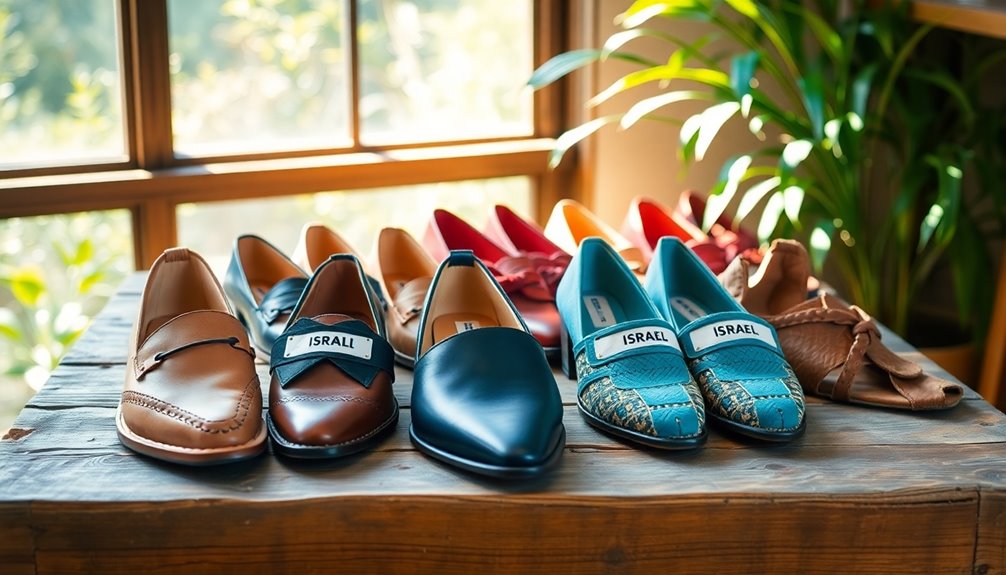
As consumers become more aware of the ethical implications behind their purchases, the choice of which shoe brands to support takes on new significance.
Many popular brands like Adidas and Skechers have faced boycotts due to their support for Israel, driving you to reflect on the ethical choices you make while shopping.
The BDS movement has spotlighted Puma's sponsorship of the Israeli Football Association, urging you to join the call to boycott Israeli companies until they change their affiliations.
To navigate this landscape, it's crucial to educate yourself on the options available.
Ethical Consumer research provides valuable resources, allowing you to make informed decisions.
If you wish to avoid supporting brands tied to Israeli policies, explore alternatives like Onitsuka Tiger or Bata.
These brands align better with ethical values and demonstrate a commitment to corporate responsibility.
Regional Insights on Shoe Brands
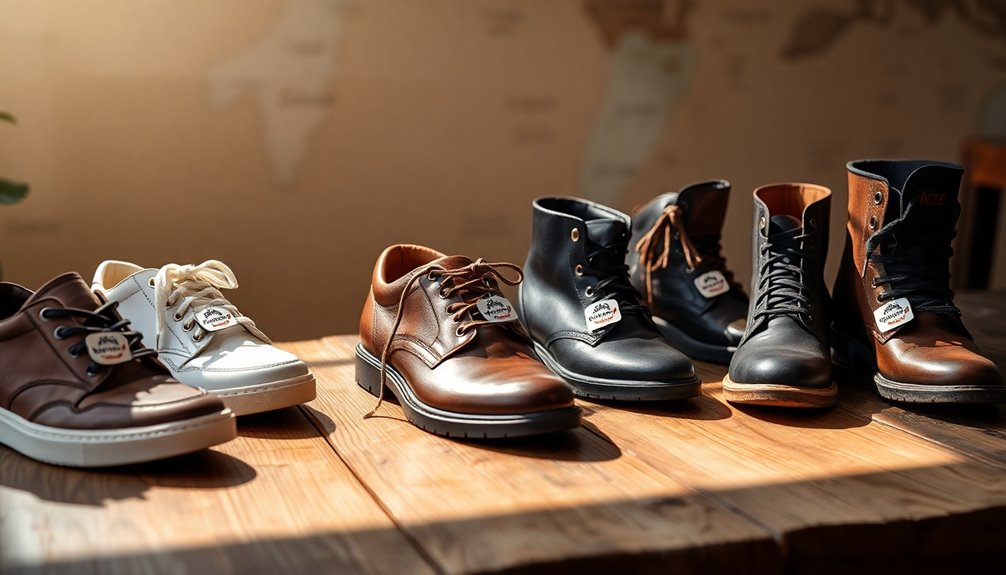
When you look at shoe brands around the world, you'll notice that local preferences and trends vary widely.
In places like Egypt and Nepal, support for Israel can influence your buying decisions, often leading you to choose more affordable local options.
Understanding these market variations helps you navigate the complex landscape of ethical consumption in footwear.
Local Preferences and Trends
Consumer sentiment shapes the landscape of shoe brands across different regions, reflecting diverse attitudes towards the Israeli-Palestinian conflict. Your preferences as a consumer directly influence which brands thrive in your area. Here are some trends you might find interesting:
- Local Brands: In Egypt and Nepal, local brands often provide affordable alternatives to international companies, catering to budget-conscious shoppers.
- Ethical Stances: In Bangladesh and Pakistan, consumers lean towards brands that align with their ethical beliefs, impacting their purchasing decisions markedly.
- Cultural Influences: Height-increasing shoes are trending in Japan, showcasing how local culture affects footwear choices, with domestic brands gaining traction.
- Geopolitical Awareness: Consumers are increasingly aware of the geopolitical issues surrounding brands, leading to shifts in brand loyalty based on their perceived stances. Additionally, understanding filial responsibility laws can further inform consumers about the ethical implications of their purchasing decisions.
As you navigate your footwear options, consider how these local preferences and trends shape the brands available to you.
Market Variations in Support
Regional insights reveal how support for Israel among shoe brands varies markedly across different markets. In Egypt and Nepal, local shoe brands show differing levels of support, greatly influenced by regional consumer sentiment and political dynamics.
In contrast, countries like Bangladesh and Pakistan reflect a growing awareness of ethical considerations, leading to shifts in consumer behavior, where many are opting to boycott brands they perceive as supporting Israel.
Price comparisons across popular brands highlight notable market differences, shaped by local economies and brand affiliations. For instance, while consumers in Japan embrace height-increasing shoe trends, they also grapple with ethical consumerism, reflecting a blend of cultural influences and moral choices.
As you navigate these varying landscapes, understanding these regional brand loyalties is essential. The cultural and political contexts surrounding these shoe brands shape how consumers perceive and interact with them.
Social Media Influence on Boycott Movements
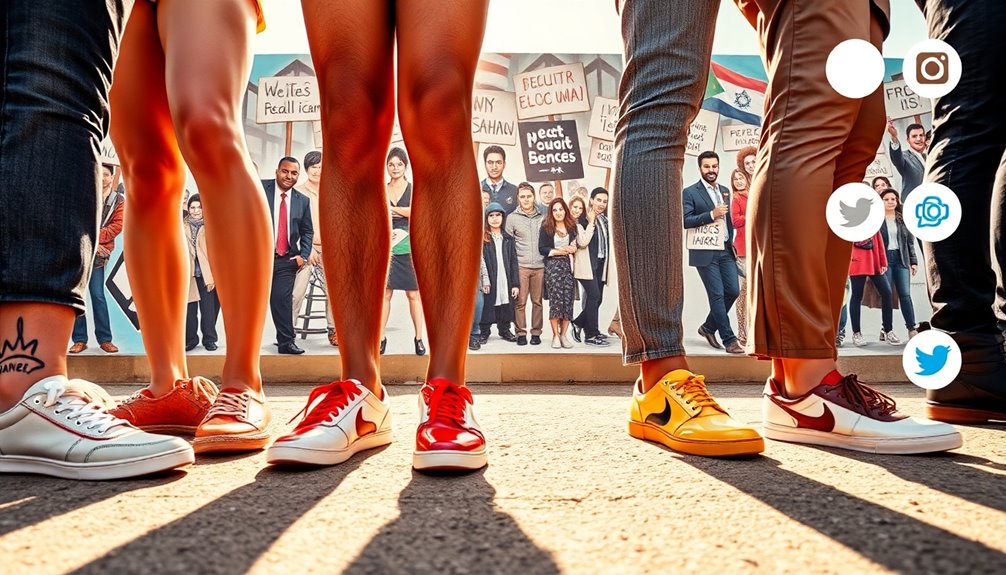
In today's digital age, social media plays an essential role in shaping public opinions and driving boycott movements against brands that support Israel.
Platforms like TikTok and Twitter amplify voices, making it easier for you to join collective actions against companies such as Adidas and Puma.
Here are four ways social media influences these boycott movements:
- Viral Campaigns: TikTok videos showcasing alternatives to Adidas have amassed over 387.2K views, spreading awareness rapidly.
- Active Hashtags: The #BoycottPUMA hashtag remains strong, encouraging ongoing consumer actions against Puma until its sponsorship of the Israeli Football Association ends in December 2024.
- Informed Consumers: Social media enables you to share information about companies' ties to Israel, impacting public perception and purchasing decisions.
- Collective Action: Major campaigns have rallied support, like the 200 Palestinian football teams urging Puma to end its sponsorship in 2018, highlighting the power of unified voices online.
With each post, tweet, or share, you contribute to a growing movement that challenges brands and holds them accountable for their affiliations.
Your participation in these digital conversations matters.
Supporting Ethical Fashion Initiatives

How can you make a difference in the fashion industry? By supporting ethical fashion initiatives, you can champion brands that prioritize human rights and environmental sustainability.
The BDS movement encourages consumers like you to boycott companies that back Israeli settlements and violate human rights. Choosing ethical brands helps promote accountability in the supply chain and guarantees that your purchases align with your values.
When you seek out brands that emphasize fair labor practices, you contribute to a system where workers aren't exploited or discriminated against. Ethical fashion brands often provide transparency about their production processes, allowing you to make informed choices.
Additionally, consider supporting local independent businesses and secondhand clothing options. These alternatives usually have a lower environmental impact and a stronger commitment to ethical practices.
As the demand for ethical consumerism rises, your choices can drive change in the fashion industry. By actively selecting brands that reflect your commitment to social justice and sustainability, you help create a market that values ethical practices over profit.
Every purchase counts, so why not make it one that supports a fairer and more sustainable world?
Frequently Asked Questions
What Brands Support Israel?
When you look into brands that support Israel, you'll find several major companies, including Adidas and Puma, facing criticism for their affiliations.
Adidas has been scrutinized for its sponsorship of Israeli events, while Puma became the main sponsor of the Israeli Football Association.
Skechers also appears in discussions about support for Israeli interests.
As a consumer, it's crucial to stay informed about these connections and consider how they align with your values.
What Shoe Company Is the Most Ethical?
When it comes to finding the most ethical shoe company, you're really in the driver's seat.
Brands like Veja and Allbirds stand out for their commitment to sustainability and fair labor practices.
You'll find that local independent footwear brands often prioritize ethics too, thanks to their simpler supply chains.
For a deeper dive, check out resources like Ethical Consumer to guide your choices and guarantee your values align with your purchases.
Which Shoe Company Supports Palestine?
If you're looking for shoe companies that support Palestine, consider brands that have publicly aligned with Palestinian rights or have taken a stand against corporate complicity in the occupation.
Companies like Veja and Allbirds focus on ethical production and environmental sustainability without ties to Israel.
What Luxury Brands Support Israel?
When you look into luxury brands that support Israel, you'll find names like Gucci, Prada, and LVMH often mentioned.
These brands have faced scrutiny for their business ties and charitable contributions linked to Israeli organizations.
Additionally, high-fashion labels like Burberry and Versace have drawn criticism for their silence on the Israeli-Palestinian conflict, leading some to perceive their inaction as support for the status quo.
It's crucial to stay informed and make choices aligned with your values.
Conclusion
As you navigate your choices in footwear, remember that your decisions can shape corporate practices. Did you know that nearly 70% of consumers are more likely to support brands that align with their values? By opting for ethical alternatives, you're not just making a fashion statement; you're joining a movement for change. Stay informed, support brands that prioritize ethics, and let your voice be heard in the world of fashion. Your choices matter!
